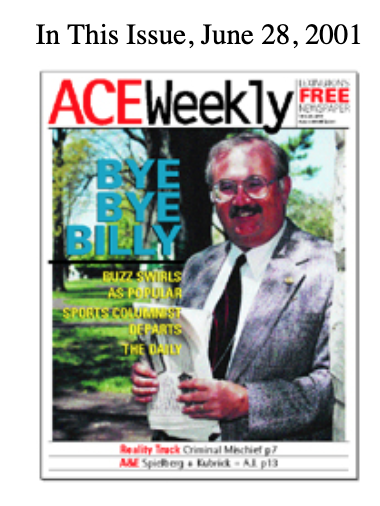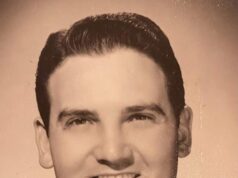World-renowned sports writer Billy Reed died February 5, 2022 in Louisville at the age of 78. The Transy Hall-of-Famer and Henry Clay alum wrote for Sports Illustrated, the Lexington Herald-Leader, and Louisville’s Courier Journal, and was named the Kentucky Sports Writer of the Year eight times.
In 2001, Ace sports writer Jeff Zurcher was a fully-disclosed fan of Reed’s work as a columnist, and Reed was a fan of Zurch’s time as a strong safety for UK football.


In 2001, Zurch sat down with one of his idols, and the two discussed Reed’s surprising exit from the Herald-Leader. Reed had already been inducted into the Basketball Writers Hall of Fame and the Kentucky Journalism Hall of Fame at the time the two spoke.



He went on to serve in communications roles in Kentucky state government, along with various appointments at KSU, IU, and Georgetown College. Judy Clabes, his editor at the Northern Kentucky Tribune, said at his passing, “He can honestly be called ‘one-of-a-kind.”
Twenty-One Years Ago in Ace: June 2001 Archive
Down For The Count?
Popular sports columnist Billy Reed calls a time-out, exits Herald-Leader
By Jeff Zurcher



Billy Reed told me this the other day: “Once, when I was working for Sports Illustrated, I was in the first-class cabin of a 747, flying from San Francisco to New York. My cabin mates included Debbie Reynolds and Dustin Hoffman.
“I tried to be cool. I didn’t bother them until we arrived. Then, I couldn’t help myself. I went up to Hoffman, who had just made Midnight Cowboy, and said, ‘Mr. Hoffman, I just wanted to tell you how much I enjoy your work.’ He smiled and said thanks.”
The day Reed told me that was Friday, June 8, 2001; he told a bunch of other people too. He told us in his final column for the Lexington Herald-Leader.
That was the thing with Reed and his writing — he made you feel like it was just you and him sitting on a front porch somewhere.
He wrote to you, not necessarily for you. He didn’t try trickery. Didn’t try cutesy. Didn’t try over-the-top. He just tried to be honest, direct, and thought-provoking. People could understand where he was coming from. And we loved him for it.
And we’ll miss him for it, too.
Yeah, I’m a fan.
And I’m not cool as Reed tried to be with Dustin Hoffman back in the late 60s.
Nah, I told him straight out of the box that I “really enjoyed reading his stuff.”
“Well, thanks, Jeff,” he said. “And I enjoyed watching you play football.”
“Thanks. That seems like a long time ago now.”
We both chuckled. I was assuaged.
And that’s how our conversation started.


Unofficially, though, the interview was just a good excuse I could use to get a guy-whose-career-I-would-like-to-have to take time out to impart some knowledge.
But after a few minutes, I figured out that Billy Reed would have taken time to chat with me even if we hadn’t had his departure from the Herald-Leader as an excuse.
His Exit


What they said about him (in the May 15, 2001 edition) was that he “resigned his position.”
Reed has a different recollection of his departure.
“Last August, I got a phone call just after [covering] the PGA Championship — and I thought I’d been doing some pretty good stuff, so my first reaction was that they [the Herald-Leader] were going to give me a raise but instead they told me I was going to get a pay cut. That kind of festered with me ever since then and yet, I went on and I felt like I was doing some pretty good stuff — I had been getting a lot of emails — like on January 9th of this year I wrote a column saying that Rick Pitino was going to be the next U of L basketball coach — it was like Secretariat at the Belmont, I was so far ahead of the pack on that one. And I thought my Derby coverage was really good. But during this whole time there was a kind of deafening silence; there was no positive reinforcement whatsoever, and that sort of bothered me. Then after the Derby I didn’t hear anything.
“You know, my contract didn’t really expire until November, so I finally said, ‘Look, you gotta do better by me, or let’s just begin talking about ending the relationship, which is just not working for me.'”
Reed reports that he said the above on a call to Mike Johnson, the paper’s deputy managing editor.
“And [Johnson] said, ‘Well, let me talk to a few people and get back to you.'”
Three hours later, Reed reports that he was informed — electronically — that the paper was exercising the clause in his contract giving him his 30 days notice that he would be evicted from his column. They then published word of his resignation in the May 8, 2001 edition. He says that they put a proposal in front of him suggesting that he write a goodbye that would appear in the Sunday edition.
“That [writing a puffy piece for a Sunday run] would have put more of a happy face on it — which was not the way I felt about it. So I just tried to do the last column in a way that I didn’t trash anybody.”
Even though he acknowledges, “I’m disappointed, hurt, felt like it was a mistake.
“I don’t feel like I’m resting on my laurels, but I’ve got so much background, experience, knowledge,” he says.
But today’s big newspapers have parent companies, profit margins, pressure. And Reed clearly feels he happened to be on the wrong side of the coin.
Through one of his vineyard of grapevines, Reed says he heard that the decision to terminate him was said to be part of a national downsizing that had been ordered by Knight-Ridder, owner of the Herald-Leader and a host of other newspapers (including San Jose Mercury News).
Contacted for comment, Herald-Leader publisher Tim Kelly responded, “Billy was a freelancer on a 30-day contract. He called one of the editors here when he heard of anticipated reductions in staffing at Knight Ridder papers and said why don’t we just end it. The editors agreed. I appreciate the good work Billy did for the Herald-Leader and am sorry that the relationship had to end.”
Coming Home
Reed says he began drawing a paycheck from the paper 42 years ago, at age 16. He stayed on there in high school and through his Transylvania days. After college, he headed west, to the Courier-Journal. He left that paper for Sports Illustrated and New York City in 1968. He came back to Louisville in ’72, became the local paper’s general columnist in ’74, and became the sports editor/columnist in ’77. Disenchanted with how the Gannett Company was running the Courier, he swung back to the Herald in 1987. And from 1988-98, Reed pulled double duty at the H-L and SI.
You gotta be good at what you do to make SI. And then leave. And then be allowed to come back a second time. While simultaneously pulling another gig. (And, consequently, another computer. In the first few years working for both, Reed had to lug two laptops, because they weren’t compatible — imagine that.)
But Reed didn’t think much of it. He was too busy thinking about home.
“This is gonna sound strange, but you know, SI is a national publication and has a readership of 24 million or something. To me, that was more of a job —I mean, I did it as well as I possibly could. Somebody told me one time that I had done more than 800 stories for them, and I’d done 12 cover stories for them — you know, I worked hard. But still, my first love has always been to have an audience in Kentucky.”
And so he has, for more than 25 years. Reed has done well here because of his passion for and knowledge of place.
Which must make the death of his column even more frustrating for him — as it does for his readers.
“I’ve spent all but four or five years in Kentucky. I’ve traveled all over the country and several foreign countries, and to me, it’s still the most beautiful place in the world. And there are things here I’ve always enjoyed: college sports, the horse racing industry. And I like, really, the lifestyle.
“What drives me? Well, I think —and I’ll be honest with you here — that ego certainly plays a role —people reading your stuff and having your picture in the paper, and people recognizing you as somewhat of a celebrity. But I just really enjoy… I enjoy writing. Taking a set of facts and circumstances and writing something about them that people want to read is engaging. It’s challenging. It has never gotten old.
“And I really enjoy the people in sports. I just want to have fun. The games. The competition. I’ve been really lucky over the years to build friendships with a lot of players over the years, a lot of coaches.”
And with a lot of readers.
Reed has received more than 120 fan emails since his last hurrah at the Herald. He speculates that the paper received some too, but he had not seen any in print (as of June 23).
“But I’m not sour,” Reed offers.
But he’s surely got to feel a little short-changed. Literally. Because he went to cover the Preakness on his own dime.
“And the Herald-Leader still used my stuff. I guess that was my lovely parting gift from them.”
Next?
But — growl — since we can no longer find Reed’s stuff in the Herald-Leader, where shall we look now?
He admits, “I’ve just kind of been sitting back, exploring my options, there are things out there —several offers on the table (involving various online and print opportunities).
“And I’d always thought I’d like to retire at 62 anyway.”
We both chuckled. And I was again assuaged.
This time, though, it was not my nerves, but my frustration.
This article appears on page 9 of the March 2022 print edition of Ace.







